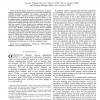Free Online Productivity Tools
i2Speak
i2Symbol
i2OCR
iTex2Img
iWeb2Print
iWeb2Shot
i2Type
iPdf2Split
iPdf2Merge
i2Bopomofo
i2Arabic
i2Style
i2Image
i2PDF
iLatex2Rtf
Sci2ools
TWC
2008
2008
Flow-level performance of opportunistic OFDM-TDMA and OFDMA networks
Abstract--In this paper, the flow-level performance of opportunistic scheduling in orthogonal frequency division multiplexing (OFDM) networks is studied. The analysis accounts for the applications with a dynamic number of competing flows, such as continuous transfers of file transport protocol (FTP) or web browsing sessions. An analytical model is developed to extend the multi-class Processor-Sharing model in single-carrier networks to multi-carrier OFDM networks, where the total service rate varies with the number of flows. Based on the analytical model, the scheduling gains in both OFDM-TDMA (time division multiple access) and OFDMA (orthogonal frequency division multiple access) networks are evaluated for low and moderate signal-tonoise ratio (SNR). Different from previous works, we focus on the scheduling performance at the flow level and consider a dynamic network setting with random sized service demands. Furthermore, we use stochastic comparison techniques to examine the effects...
Division Multiple Access | Orthogonal Frequency Division | Orthogonal Frequency Division Multiple Access | TWC 2008 |
| Added | 16 Dec 2010 |
| Updated | 16 Dec 2010 |
| Type | Journal |
| Year | 2008 |
| Where | TWC |
| Authors | Lei Lei, Chuang Lin, Jun Cai, Xuemin Shen |
Comments (0)

